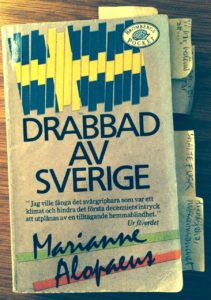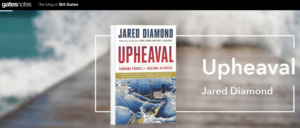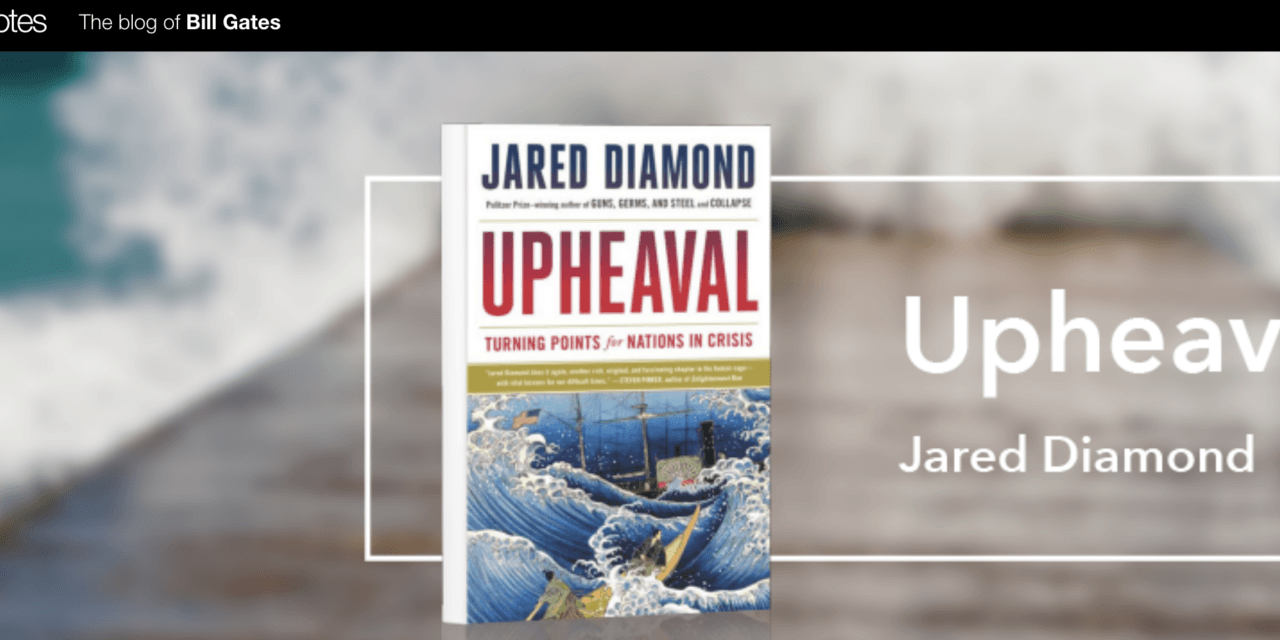 Efter att ha påmint på min offentliga Facebook-sida om Marianne Alopaeus, finlandssvensk författare, och hennes bok Drabbad av Sverige, som jag skrev om i inlägget Hon drabbades av Sverige (läs det först), fick jag ett mejl från en finlandssvensk man som sett det. Han skrev så här:
Efter att ha påmint på min offentliga Facebook-sida om Marianne Alopaeus, finlandssvensk författare, och hennes bok Drabbad av Sverige, som jag skrev om i inlägget Hon drabbades av Sverige (läs det först), fick jag ett mejl från en finlandssvensk man som sett det. Han skrev så här:
För att ytterligare lägga Sverige och dess samhällsklimat i det globala sammanhanget, läs kapitlet om Finland i Jared Diamonds bok Upheaval. Min uppfattning är att Sverige hade gått under där Finland överlevde.
Han har med stor sannolikhet rätt.


Bill Gates skriver bland annat så här på sin blogg gatesnotes om boken av Jared Diamond, och då främst om kapitlet om Finland:
Finland has a powerful sense of its own uniqueness and was dead set on maintaining its independence. To make the point about the strength of Finnish national identity, Jared takes you on a fun tour of the notoriously difficult Finnish language.
Though Finland was proud, it was also realistic. It understood that if the Soviets felt like taking over, they would. So, instead of ignoring the Soviet presence, which is what it had done before World War II, Finland decided to persuade the Soviets that they would gain nothing by occupying the country.
———-
Sometimes, staying in the Soviets’ good graces required questionable sacrifices. For example, the Finnish press was routinely silent on Soviet abuses in order to avoid giving offense. Diplomats coined the term “Finlandization” to mean weaker countries pandering unnecessarily to stronger ones, but Jared points out that the countries these diplomats represented never came to Finland’s aid when it was desperately trying to hold off invading Soviet troops during the war.Amazingly, by taking this approach, Finland not only maintained its status as an independent democracy; it also made itself indispensable to the Soviets as a source of Western technology and the country’s window to the West. Ultimately, Finland was much more useful to the Soviet Union as a friend than it would have been as just another puppet state.
Här samtalar Bill Gates med Jared Diamond:
Några korta utdrag ur det långa kapitlet om Finland i boken Upheaval:
In the century before World War One Finland was just an autonomous part of Russia, not an independent nation. It was poor and received little attention within Europe, and almost no attention outside Europe. Today Finland is known around the world for its technology and its industry and has become one of the world’s richest countries.
———-
If you are visiting Finland for the first time and you want to understand the Finnish people and their history, a good place to begin is by visiting Hietaniemi Cemetery, (Sandudd på svenska, min anm.) the largest cemetery in Finlands’s capital city of Helsinki. Unlike the United States, which buries its soldiers in Arlington National Cemetery outside Washington and in other separate veterans’ cemeteries around the country, Finland does not have separate military cemeteries. Instead Finlands’ fallen soldiers are brought home to be buried in the civilian cemeteries of their town or parish. A large section of Hietaniemi Cemetery is devoted to dead soldiers from Helsinki. They hold a place of honor there, just uphill from the graves of Finlands’ presidents and other political leaders, and around the monument of Finland’s Field Marshal Carl Gustaf Mannerheim (1867-1951).
Jared Diamond berättar om hur han tyckte att vardagsrummet hos en familj som han blev hembjuden till i Helsingfors var det vackraste rum han någonsin sett:
On reflection, I then wondered whyI found it so beautiful, because the room was a nearly-empty cubicle with just a few pieces of simple furniture. But the materials and the form of the room, and those few pieces of furniture were typically Finnish in their simplicity and beauty.
Författaren berättar också om sitt första besök i Finland sommaren 1959:
That was only 15 years after the end of Finlands’ war with the Soviet Union and only four years after the Soviet Union had evacuated its military base on Finnish soil on the outskirts of Helsinki. My Finnish hosts were veterans, widows and children of the war plus Finnish soldiers on active duty. They recounted to me their own life stories and heir countrys’ recent history. I learned enough of the wonderful Finnish language to make my way around as a tourist, to appreciate how the language contributes to Finland’s sense on uniqueness.
———-
For those of you readers who haven’t had the good fortune to visit Finland, some features of my book’s framework of crisis and change to keep in mind as you read the following account include: the strength and origins of Finnish national identity; Finn’s ultra-realistic assessment of their country’s geopolitical situation; the resulting paradoxical combination of selective changes that I mentioned in my opening paragraph; and Finlands lack of freedom of choice, lack of help received from allies at crucial moments, and lack of available successful models.
Jared Diamond har också förstått det som alltför få svenskar förstår, att finländare inte är som svenskar:
Geography, language and culture make Finns different from other Scandinavians, and they are proud of those differences. As for geography, descriptions of Finland by Finns reiterate two themes:
”We are a small country”
and
”Our geography will never change.”By the latter phrase, Finns mean that Finland’s land border with Russia (or with Russia’s previous incarnation as the Soviet Union) is longer than that of any other European country.
Finland is in effect a buffer zone between Russia and the rest of Scandinavia.
I kapitlet får man lära sig mycket om Finland, språket, finländarnas nationella stolthet och identitet. Det finns inga likheter med Sverige och det har också jag skrivit om i otaliga inlägg under 15 års tid här på den här sajten. Dock utan att lyckas få svenskar att förstå att finländarna inte är ”nästan-svenskar”, vilket många svenskt storvulet envisas med att insistera att vi är. Jag vet inte varför, men troligen har det att göra med svenskarnas megalomana inställning till sig själva och deras genuina tro att alla vill bli ”svenskar” för att det är det bästa man kan vara. Att försöka pådyvla människor från andra länder ”svenskhet”B (vad det nu är, annat än ett ord…) fungerar inte, allra minst på finländare. Om språket, som Jared Diamond tycks ha en stor kärlek till, skriver han:
Finnish is a beautiful language, an d the focus of Finland’s national pride and identity. Finland’s national epic poem, the Kalevala, holds an even bigger place in Finland’s national consciousness than do the lays of Shakespeare for English-speakers. To outsiders, Finnish is not only a beautiful language with a singing quality, but also a very difficult one to learn. One thing that makes it difficult is its vocabulary, because its words don’t have familiar Indo-European roots. Instead, most Finnish words have to be memorized one by one.
Jared Diamond skriver många sidor om det finska språket, han verkar närmast förtrollad, och en stor beundrare av det. Sedan handlar texten om krigen, allt detta kan läsas i kapitlet som kan laddas ner utan kostnad via Bill Gates blogg. Ett kort utdrag ur texten om krigen:
At the time that war broke out on November 30, 1939, the details of this absurd military mismatch were as follows. The Soviet Union had a population of 170 million, compared to Finland’s population of 3,700.000. The Soviet Union attacked Finland with ”only” four of its armies, totaling 500.000 men, and keeping many other armies in reserve or for other military purposes.
Finland defended itself with its entire army, consisting of nine divisions, totaling only 120.000 men. The Soviet Union supported its attacking infantry with thousands of tanks, modern war planes and modern artillery; Finland was almost without tanks, modern war planes, modern artillery, anti-tank guns and anti-aircraft defenses. Worst of all, though the Finnish army did have good rifles and machine guns, it had very limited stocks of ammunition; soldiers were told to save ammunition by holding fire until Soviet attackers were close.
———-
To the great surprise of the Soviet Union and te rest of the world, Finland’s defense held.
Sverige nämns också:
Widespread sympathy for little Finland bravely fighting the big Soviet aggressor inspired 12.000 foreign volunteers, mostly from Sweden, to come to Finland to fight.
Kapitlet är långt och intressant. Det slutar så här:
Another part of the explanation is Finns’ sense of the distinctiveness shared by all Finns: that both the winners and the losers of the Finnish Civil War shared the same egalitarian tradition, and were unique among the world’s people in speaking the Finnish language, reciting the Kalevala, and being the countrymen of Jean Sibelius and Paavo Nurmi.
Läs om en av de svenskar som frivilligt stred för Finlands frihet och självständighet, Jan-Erik Kjellberg, i texten Självständighetsdagen. Oväntat möte med den svenske Finlandsveteranen igen. (7 december 2018)
 Ett tips: se filmen Okänd soldat efter romanen med samma namn av Väinö Linna, som själv deltog i kriget.
Ett tips: se filmen Okänd soldat efter romanen med samma namn av Väinö Linna, som själv deltog i kriget.

